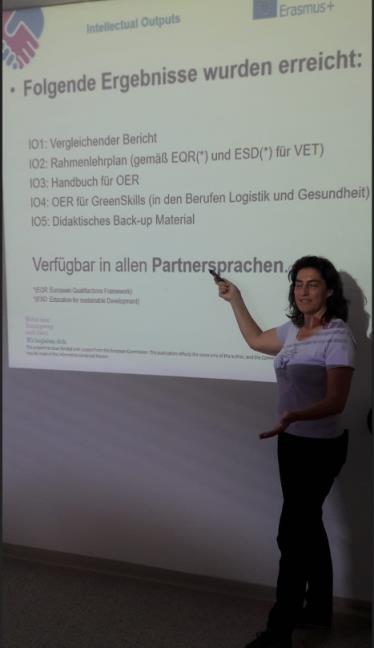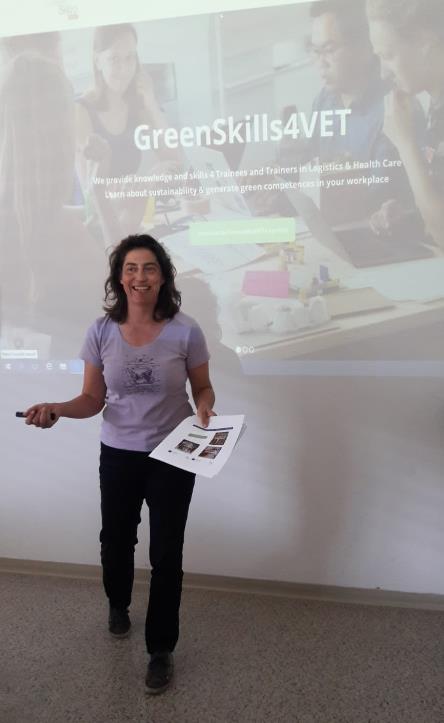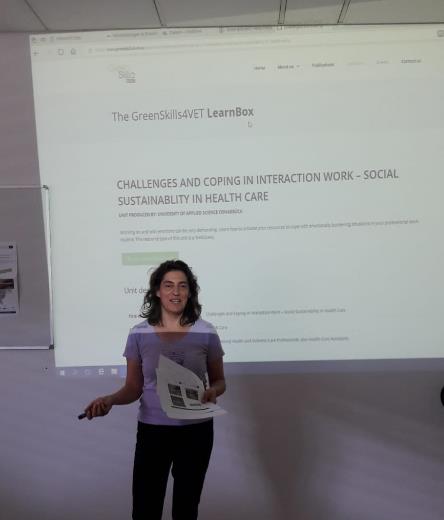Multiplier Event
zum Internationalen Projekt des BFI-OÖ
on 16.06.2018
Start: 14:00
venue: BFI OÖ, WELS
1. Reporting
On 16th July, 2018, BFI Oberösterreich (BFI OÖ) promoted the final Conference from GreenSKills4VET (Open Educational Resources in Vocational Education and Training with regard to Education for Sustainable Developement) project, a project approaching green skills in education.
This project was approved by Erasmus+ Program, and it was funded by the European Commission, in Key Action 2: Cooperation for innovation and the exchange of good practices, developed in a partnership between Germany, Austria, France, Greece and Bulgaria.
GreenSkills4VET stands for vocational training for sustainable development and aims the ecological challenges due to the climate change bring a high demand for creating professional competences meaning not only a new adjustment of professional qualifications. The renewalof innovating teaching strategies and learning strategies is critical to rise up to the challenges. The digital revolution carries the ability to humanise the work place and the methods of production with the help of the digital technologies. Open educational media stronter implies participatory elements which include the learning subject in the whole educational process. So the need of the implementation of both aspects (ESD/OER) in the job-related learning is evident.
For the multiplier event, BFI OÖ focused on its communication channels, mailing list, leaflets and paper invitations to relevant institutions on logistic and health care sector. It was very different to find professionals from logistic sector who were able to join our conference. According to our target group Health care teachers were involved.
AGENDA:
| Zeit | Thema | Organisation |
| 14:00 – 14:30 | Ankommen und Registieren | |
| 14:30 – 15:00 | Vorstellung Projekt GreenSkills4VET | BFI OÖ,
Gabriele Winkler |
| 15:30 – 16:15 | Lernbox IO5, Vorstellung und Diskussion der entwickelten Materialien | BFI OÖ
Gabriele Winkler |
| 16:15 – 17:00 | Diskussion | BFI OÖ
Gabriele Winkler |
| 17:00 – | Netzwerken und Ausklang |
The multiplier event was performed in different moments. After this first introduction on the topic, some specific materials and OER were presented by Gabriele Winkler. Finally we discussed ESD concept and OER materials for teachers daily life.
The event covered 10 people from different healthcare backgrounds, ages and levels. At least the feedback on the Conference was very good.
2. Recommendations
In general, Multiplier Events are a good instrument to bring the project contents and results into public. We recommend to find stakeholders, who can transfer the results of discussion to their own system, so that the feasibility to the own system (institution) is given.
Another point is the fact to motivate people to take part on multiplier events. Especially for BFI OÖ for topic Logistic it was hard to find interested people who want to spend time on our topic. It seems that Logistic is very national organized. Also our project partner Cereq analysed in their studies that sustainable work practices in logistic and transport sector is still poorly disseminated and we think that could be a reason that experts do not see a benefit in our multiplier event. In addition it seems that the contents need to be very national oriented. We estimate that another issue could be the competition in between the companies worldwide, so they are not very interested in sharing information. Also the situation for logistic teachers is specific in Austria, because we only have one VET school for this apprenticeship, which is located in another federal state with different national state laws.
It is a better situation on health care sector. They are more open minded for sustainability and their needs. Al least we could do a multiplier event with health care teachers, which are free lancers to BFI.
Finally I would recommend for future Multiplier Events to present the contents as concrete as possible. In our project the exemplary OER teaching materials were highly welcome.



